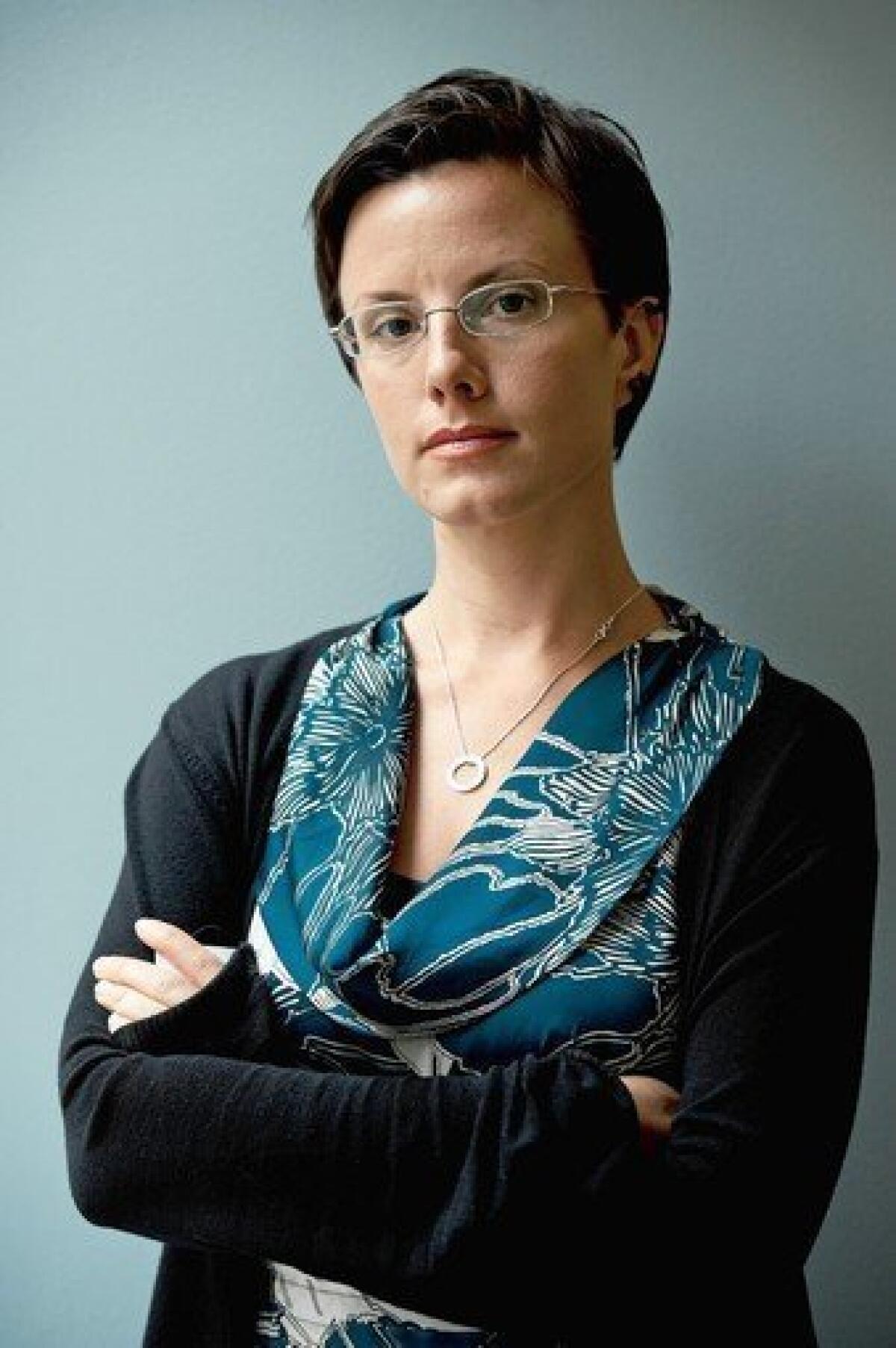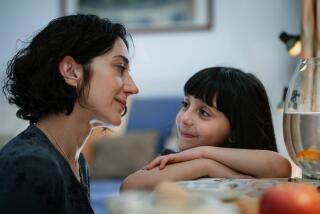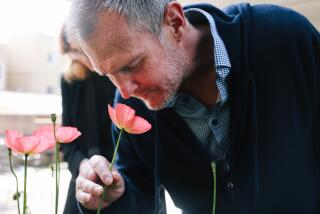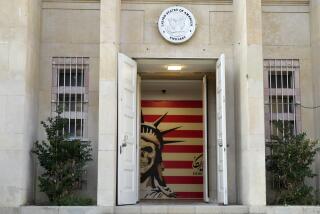The long hike from an Iranian prison to home

Two years ago, Californian and citizen of the world Sarah Shourd was released from prison in Iran after an intense international campaign to free her. A bit more than a year later, that effort, including pressure from the State Department, Oman (the “Switzerland of the Middle East”) and even Iraq and Venezuela, also won the release of Shourd’s then-fiance, Shane Bauer, and their friend, Josh Fattal. The three Americans had been hiking in 2009 in Iraqi Kurdistan when they were snatched at the Iranian border and accused of spying. Ever since, in jail and out, they’ve been in the world’s spotlight. They’ll tell their story in a book next year — and here, as Shourd marks her second anniversary of freedom.
How are you, two years later?
Most of my symptoms [of post-traumatic stress] are not inhibiting my life or my career. For the first year, nothing could stop me from working for Josh and Shane’s freedom. I would break out in hives, [had] really serious insomnia. Emotional detachment allowed me to get through that time. But as soon as Josh and Shane got out, I took my feelings very seriously. I have been in therapy, and [doing] yoga and learning how to slow my breathing. [With] PTSD, you’re constantly in a state of crisis. You react to really small things as if they were life and death. You learn how to coax your nervous system back down to a normal level.
You’d said after your release that you wanted to pursue Middle Eastern studies and conflict resolution. Have you?
My life and my career and my dreams are moving forward steadily, and so I don’t really feel the need to go back to school. I need to move forward pretty fast, because [I lost] two years of my life. I have a blog on Huffington Post; I’m working as a part-time consultant with a human rights organization called United 4 Iran. The thing I’m most passionate about is advocating against the excessive use of solitary confinement.
I can’t wait to go back [to the Middle East]. I spent one of the best years of my life in Syria before I was captured. It’s difficult for me to watch the news because I have friends there, and the neighborhood I used to live in on the outskirts of Damascus is now a war zone. I want much more international pressure on Assad. My dream is that Syria will be freed as soon as possible and I [can] go celebrate with my friends in a free Syria. I feel the same about Iran.
Yet in Egypt, after the Arab Spring, elements of the pro-Islamist Muslim Brotherhood took power in the elections.
It’s a slow process. We didn’t develop our democracy overnight, and our democracy is far from perfect as it is. It’s hard to get [Egypt’s] large population on the same page; that’s not what democracy is about. And in Iran, they’ve been fighting for democracy for decades. They’re not going to give up. But these things take time.
How did you come by your worldview? How would you characterize it?
I consider the global community to be my community. I started being an activist after 9/11, an antiwar activist. I draw inspiration about what needs to happen in our country from struggles in other countries. I started doing solidarity work for the [Mexican] Zapatistas in the early 2000s, building clinics and raising funds for autonomous projects. I was impressed by their model and their values. There’s a lot to learn outside our borders, so we can apply it wherever we are.
There’s speculation about why you were imprisoned, and why you were released. Were you pawns in Iranian internal politics?
Of course we were pawns, and we weren’t alone. The Iranian government wants to place the blame on outsiders, especially Westerners, in an attempt to control internal dissent. But they’ve already lost the respect of a vast majority of the Iranian people. We got tremendous support from Iranians; thousands of messages on Facebook from Iranians all over the world saying “please don’t confuse us with our government.”
The human rights situation should be at the center of the debate on Iran. We hear about the nuclear issue — any talk of an attack on Iran is the most frightening thing. An attack on Iran would give the Iranian government an excuse to consolidate power and repress people even more. The Iranian people are not anti-American. If we were to attack them, though, that would change. They would feel it necessary to rally behind their government for their own protection.
The Times ran a column about the “hiker hate” your case inspired. What was behind that?
As soon as your life is on the public stage, you’re going to be the target of criticism and misunderstanding. There’s a lot of misunderstanding about the Middle East, about what we were doing there, about where we were when we were captured. The important thing for me is that the legacy be positive. We have to turn our worst experiences into catalysts for change. If I were to internalize what was done to me — illegal detention and psychological torture, solitary confinement — I would probably want some kind of revenge, but I refuse to let hate and injustice change the person I am. I feel more certain of my values than I ever did, so people can say what they want to say. It’s taken a tremendous toll. But it’s also showed me what I’m made of.
You were accused of everything from being dumb American kids to being spies.
Most people don’t know I was living in Syria and teaching English to Iraqi refugees, or that Shane is fluent in Arabic and worked in the Middle East for almost a decade. [We went to] a popular tourist destination where many people go to hike and river raft. We were extremely unlucky.
Your critics cited some of your writings as pro-Palestinian, along with your friendships with Syrians and Palestinians.
That’s why we’re writing the book: to set the record straight. I’ve been to visit Palestinian Israel, and I want a peaceful solution. I want Palestinians and Israelis to live in peace.
Was imprisonment the big demarcation in your life?
The most influential years of my life were the last three. In Syria, we were part of a community of artists and intellectuals and activists. That year expanded my mind exponentially. As a prisoner and hostage, I experienced a terrible side of the Middle East — the corrupt dictatorships. I’ve experienced the best and the worst of the Middle East, and I’ll never turn my back on either one.
How would you bridge the misunderstandings between us and them?
We need as much cultural exchange as possible. When you think about how many American movies and how much American music people in the Middle East absorb, and how little we absorb of theirs, it shocks me. Many Americans’ impression of the Middle East comes from our own films, many of them horribly racist and ignorant. Iran has incredible cinema, so powerful and moving. [It has] brought so much esteem that their government doesn’t even censor it as they do everything else. It’s Iran’s gift to the world.
Aren’t Americans justified in thinking that some elements in the Middle East are indeed hostile to us?
That reminds me of something one of my prison guards said. One spoke some Arabic, and I spoke some Arabic, and I said something like, “I’m not bad; why am I here? I don’t hate Iran.” And she said, “There’s some good in Iran and some bad.” There’s some good in America and some bad. People need a more nuanced analysis of the world.
Why is solitary confinement your cause?
I was in solitary confinement 410 days. I had hallucinations. I had violent panic attacks. I beat at the walls until my knuckles bled. I know the toll it takes. Prolonged solitary confinement is without a doubt psychological torture. It’s used in our own prisons as a routine practice; it’s used for something as small as not returning a book on time.
Should it be banned?
I agree with a U.N. expert that it should be proscribed except as a very last resort. It’s morally wrong. It’s also costing us a lot of tax dollars to keep people in isolation. It doesn’t help an individual’s reform.
Was it hard for you to be around people again?
Extremely difficult. I’d been dreaming for 13 1/2 months of not being alone, but when I was released, I found it difficult to interact with other human beings. My family, people I had been yearning to see — I found myself overwhelmed, difficult to make physical contact, very jumpy.
You heard in prison that people like Desmond Tutu and Ban Ki-moon were speaking on your behalf.
That was phenomenal, to have some of the people I admire the most in the world speak up for me. That keeps you sane in prison. Even though every cell in my body felt like I was lost to the world, I knew in my mind that wasn’t true and I was able to hold onto hope. I believe we were released because there was enough pressure internationally [that it became] a tipping point, simple as that. Eventually we became a liability for Iran, and they finally let us go. It’s the recipe for freeing political prisoners everywhere.
After such an experience a lot of people would decide to never leave their ZIP Code again. You feel the opposite.
I’m the same person I was before. When I see something in the news, I can’t have any detachment from it. There are many lives behind political decisions that are made every day.
Shane, your husband now, proposed to you in prison with a ring he wove from the red-and-white threads from his T-shirt. Do you still have it?
In that first year [of freedom,] I was in Boston to meet with Noam Chomsky. I looked down at my finger and it was gone, in the snow. I spent 45 minutes looking and I couldn’t find it. But I knew the real one was going to come. I’ve gotten better at dealing with disappointment, let’s put it like that!
Follow Patt Morrison on Twitter @pattmlatimes
This interview was edited and excerpted from a taped transcript. An archive of Morrison’s interviews can be found at latimes.com/pattasks.
More to Read
A cure for the common opinion
Get thought-provoking perspectives with our weekly newsletter.
You may occasionally receive promotional content from the Los Angeles Times.







